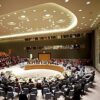Sustained multilateral cooperation remains essential to countering terrorism effectively, says Vladimir Voronkov, Under Secretary-General, United Nations Office of Counter-Terrorism.
He said terrorism remained a significant and evolving threat to global peace and security, one that no state could confront in isolation.
Voronkov made this known on Monday while briefing the UN Security Council on the 20th Report of the Secretary-General on threats to international peace and security caused by terrorist acts, and efforts to counter terrorism.
According to him, the resilience of terrorist groups underscores the need for sustained international collaboration.
He emphasised that the terrorism landscape was evolving and demanded collective multilateral action, as terrorist attacks threatened life, well’being and fundamental rights and freedom of individuals.
“Despite steady counter-terrorism efforts by member-states, international and regional partners, Da’esh continues to demonstrate resilience and adapt its modus operandi.
“In Sub Saharan Africa, Da’esh and its affiliates continue to increase their operations and expand territorial control.
“This situation is deeply concerning in West Africa and the Sahel, where Da’esh affiliates and other terrorist groups intensified attacks, including against schools in Burkina Faso, Mali and Niger,” he said.
He noted that in the Democratic Republic of the Congo, allied democratic forces remained resilient in spite of military operations conducted by Congolese and Ugandan forces, and perpetrated horrific attacks resulting in over 300 civilian fatalities.
Voronkov urged UN member-states to prioritise comprehensive long-term responses which would address the conditions conducive to terrorism while strengthening the rule of law and upholding international human rights.
Highlighting four priority areas of focus, he said that, as Sub Saharan Africa had become the epicenter of global terrorism, his office had prioritised capacity building support for the continent.
“Last year, my office increased its delivery of technical assistance by 16 per cent.
“For instance, our fusion cell programme delivered specialised training to 124 analysts from 21 African member-states.
“Our vulnerable targets programme provided tailored support to five new African beneficiaries – Benin, Cote d’Ivoire, Kenya, Mauritania and Senegal – to enhance security of critical infrastructure and soft targets.”
He also said there was need to further strengthen border security to counter movements of terrorists.
He added that his office delivered operational trainings to over 100 officials in Southeast Asia and West Africa to operate unmanned aerial systems for counter-terrorism and border security purposes.
According to him, the UN continues to adapt and tailor its capacity building support to address threat posed by Da’esh and its affiliates.
“In the pact for the future adopted last September, member-states renewed their commitments to a future free from terrorism.
“The UN, through its global counter terrorism coordination compact, remained committed to supporting member-states.
“In this regard, by working together, we can address this evolving threat and build a more secure future,” Voronkov said.




























